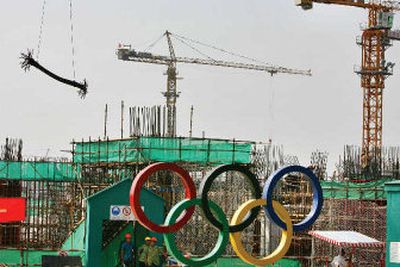Wanted: a sporting chance

BEIJING — Beijing’s spending bonanza for the 2008 Olympics is proving a disappointment to foreign companies, who say they are being effectively locked out of most contracts.
With China allocating billions of dollars to the Games, the frustration among foreigners over so far scant opportunities, voiced privately for months, broke out in the open in October. A senior executive with General Electric Co., in published remarks, criticized the bidding process as opaque and skewed toward domestic firms.
“The authorities are currently unable to ensure that the bidding process is fair,” the American Chamber of Commerce-China’s monthly magazine quoted Li Jianbo, a GE executive in charge of relations with the Chinese government, as saying.
The city government office overseeing Olympics projects and the organizing committee said that contract awards were being properly conducted.
“As far as we know, the bidding process has been proceeding transparently, openly and fairly,” said a spokeswoman with the Beijing 2008 Olympics Projects Office who identified herself as Ms. Shi.
Both agencies pointed out that foreigners have not been excluded.
Australian and European architects, for example, are designing several venues, including the $386 million National Stadium, the Games’ signature architectural work.
London-based Ove Arup & Partners is providing design, engineering and project management services for a handful of venues and related infrastructure projects.
But no American company has been awarded a sizable contract. What contracts foreigners have won pales in comparison with the huge sums involved: China is spending $2.4 billion on Olympic venues alone and another $35 billion to $40 billion on remaking the city for 2008. Projects range from new power, water and sewage treatment plants to the world’s largest airport terminal.
That disparity has stoked discontent. Many foreign firms hoped that winning Olympics contracts would provide an opening to the wider domestic market. Their unhappiness has thrown a spotlight on China’s less-than-free-market economy, in which the communist government and state-connected companies often play decisive roles.
The GE executive’s criticism about the bidding process were among the first public complaints about China’s handling of contracts. Most foreign executives have declined public criticism, fearing that it will harm future business opportunities in China.
Yet GE’s fate is seen by other foreign Olympic business hopefuls as a bellwether. The company is one of a select group of global sponsors of the Olympics. Its advertisements — for everything from electric power to water treatment — are plastered all over Beijing.
If companies like GE which have abundant resources to track down hard-to-get information are having difficulties, smaller firms have minimal chance to win business, said a foreign consultant in Beijing.
The consultant, who requested anonymity so as not to jeopardize chances of future Olympics contracts, described the bidding process as a nightmare. He said that details on bidding are so tightly held that only insiders know what’s going on.
Host cities are not required to give foreigners contracts, only to ensure that Olympic funds are not misused. While preparations for the Sydney Games raised few complaints about access, construction delays in Athens caused organizers to forgo normal bidding procedures and turn to Greek contractors. Critics called it a convenient way to reward politically connected firms.
Some of the foreigners’ frustrations in Beijing stem from yearslong trade frictions. Government decrees place a high bar for foreign participation in construction projects, requiring foreign construction firms to set up well-funded local entities and foreign architects to work with local partners.